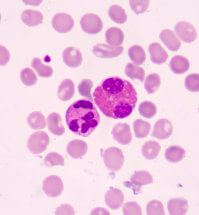You are curious about your overall health. You have heard about a general blood test that could help you with this question. What is such a general blood test? Which values are measured with this test? And what do these values say about your health? Read on for the answers.


What is a general blood test?
A general blood test, also known as a complete blood count, is a test performed to obtain information about someone’s health status. During a general blood test, blood is drawn and various values are measured, such as red blood cells, white blood cells, platelets, but information about kidney and liver function can also be obtained. There are hundreds of values that can be determined in the blood. An abnormal value in the blood test does not necessarily mean that you are ill, and a completely normal blood test does not guarantee that there is no illness. How does that work?
A general blood test can be performed by the general practitioner as part of a routine check-up, for example, if there is a chronic illness, or can be performed when there are unexplained symptoms, such as fatigue, shortness of breath, or fever. The blood test can then be used to increase or decrease the likelihood of certain diagnoses. The combination of personal characteristics (gender, age, medical history, medication use), the symptoms someone may be experiencing, and the combination of certain results from the blood test can provide an overview of someone’s overall health status. The results found in a general blood test should always be seen in the context of the rest of a person and should not be viewed as a result on their own.

What is tested in a complete blood test?
What blood values are included in a complete blood count? Below you will find a list of all blood values that can be checked when you go for blood testing. Additionally, you will find an explanation of the meaning and relevance of each specific value.
Red blood cells/erythrocytes (RBCs)
Red blood cells are responsible for transporting oxygen throughout the body. When there are too few red blood cells, it may indicate anemia.
Hemoglobin (Hb)
Hemoglobin is a protein found in red blood cells that binds to oxygen, allowing oxygen to be transported from the lungs to the rest of the body. When there is anemia, this value is too low.
Hematocrit (Ht)
Hematocrit is a measure of the volume of red blood cells. When it is too low, it may indicate anemia.
Mean corpuscular volume (MCV)
MCV value is a measure of the size of red blood cells. When there is anemia, the MCV may indicate the possible cause of this anemia (for example, a vitamin deficiency, loss of red blood cells, or an autoimmune reaction of the body to red blood cells).
White blood cells/leukocytes
White blood cells are important for the immune system and thus protect the body against infections. An elevated number of white blood cells indicates an infection.



Platelets/thrombocytes
Platelets are important for blood clotting. A deficiency in platelets can lead to bruising, bleeding gums, or wounds that continue to bleed for a long time.
Sodium
Sodium is an electrolyte involved in the balance of fluids in the body. When the sodium level is abnormal, it may indicate dehydration, heart failure, or kidney problems.
Potassium
Potassium is an electrolyte involved in muscle and nerve function. Abnormalities may indicate kidney problems, among others.
Liver function tests (ALAT, GGT, AF)
The combination of these different markers provides information about liver function. If the values are abnormal, there may be liver damage, liver disease, or bile duct problems.
Kidney function tests (eGFR, creatinine)
This marker provides information about kidney function. Kidneys filter waste products from the blood. When creatinine is too high or eGFR is too low, it may indicate decreased kidney function.
Iron levels (iron, ferritin, transferrin)
Iron is an important mineral used for the production of the protein hemoglobin (see above). Too little iron leads to too little hemoglobin and is thus a possible cause of anemia. This is more common in women with heavy menstruation, as they lose iron during menstruation. Ferritin is the protein in which iron is stored in the body. Transferrin is the protein that transports iron through the body. These values are determined when there is anemia. When these values are out of balance, it may indicate an iron deficiency or excess. Both can cause symptoms.
Glucose
This is the amount of sugar in the blood. When glucose is too high, it indicates diabetes or a prediabetic condition.
CRP
This value provides information about the presence of an inflammatory process somewhere in the body. When this value is too high, there may be inflammation.


Cholesterol levels
There are multiple markers in the blood that collectively provide information about cholesterol levels. These values are used to screen for cardiovascular diseases or to monitor someone who has already had a heart or vascular disease.
- HDL cholesterol, also known as high-density lipoprotein cholesterol. This is also called ‘good’ cholesterol. It helps remove excess cholesterol from the blood, thus protecting against cardiovascular diseases (atherosclerosis, heart attack, stroke, etc.).
- LDL cholesterol, also known as low-density lipoprotein cholesterol. This is also called ‘bad’ cholesterol. Don’t get me wrong: your body also needs this LDL cholesterol to function properly, but when this value is too high, it can narrow blood vessels and thus pose a risk of cardiovascular diseases.
- LDL/HDL ratio: this is the ratio between the two types of cholesterol mentioned above and provides additional information about the potential risk of cardiovascular diseases.
- Total cholesterol: this is the total sum of cholesterol (both HDL and LDL).
- Triglycerides: these are fats that circulate in the blood and provide energy to the body.
Why should you consider preventive blood testing?
Although a general blood test is typically conducted when someone has specific symptoms or complaints, it can also be used preventively to detect abnormalities early and potentially prevent diseases. A commonly used preventive blood test at the general practitioner is the blood test for the risk of cardiovascular diseases (atherosclerosis, heart attack, stroke, etc.). This includes assessing kidney function and cholesterol levels, as well as sugar levels to see if there may be diabetes.
At the general practitioner, preventive blood testing is only used when the doctor indicates it. It is then (partially) covered by health insurance. If there is no indication for preventive blood testing (for example, because you have no risk factors for developing a certain disease), you will have to pay for the blood test yourself. You can have such preventive blood testing done at Easly without needing a referral from your general practitioner.


What does a general blood test cost?
When the general practitioner indicates a general blood test because you have specific complaints or risk factors for developing certain diseases, it is covered by health insurance. However, you will first use your own risk excess. If you have already spent your own risk excess, it will be paid for by your health insurance. If the general practitioner does not suspect a disease or abnormality in your blood profile, no blood test will be conducted and therefore it will not be covered by health insurance. If you are still curious about certain blood values, you can have them determined at Easly. You can easily perform a general blood test at home.
Related tests



In conclusion, a general blood test is an important tool to get an overview of someone’s overall health. It is important to note that a general blood test only covers a small part of the many hundreds of markers that can be determined in the blood. Additionally, the blood test is only a small part of assessing someone’s health status. A diagnosis cannot be made solely based on these blood values. It is also extremely important to consider someone’s medical history, personal characteristics (gender and age), lifestyle factors, and medication use. If you have symptoms, always consult your general practitioner before conducting your own research; your general practitioner can advise you on which blood tests are suitable for you.







